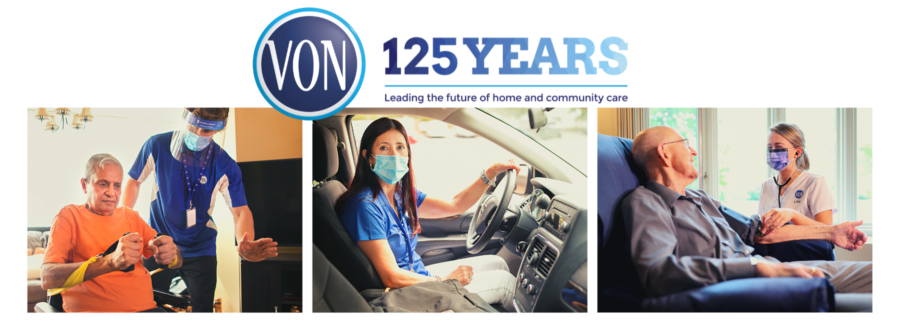From the Halifax Explosion to COVID-19, VON has been meeting the needs of local communities since 1897. Today, VON has outposts across the country, but Halifax is home to the first office in Canada. “We were actually the first home care nurses and the first public health nurses in most communities — especially for those who couldn’t afford private or hospital care,” says President and CEO Jo-Anne Poirier. “We now provide not only home nursing care, but other types of home care, home support, and community support services like Adult Day Programs and Meals on Wheels.”
While communities and their needs have changed since 1897, the VON approach remains the same. “It’s not really a story of how much we’ve changed,” says Poirier. “But how we’ve been on the ground in homes and communities for more than a century, responding to whatever the local needs might be at the time and providing care and services based on that need.”
A century ago, VON prioritized issues like maternal and child mortality, the aftermath of the Halifax Explosion, and typhoid outbreaks. “Today it’s food insecurity, COVID-19, and seniors who want to age safely in their homes,” Poirier says. “VON has always focused on identifying and responding to local needs with the best care and services we can possibly provide.”
Highlighting the impact
VON now provides care to more than 10,000 people every day in Ontario and Nova Scotia, through an incredible number of programs and services. “One of the important things about responding to community need is being able to expand our programs and services in response to increased demand,” says Poirier. “We’re proud of how our programs and services reach so many across Nova Scotia every day.”
VON’s impact is reflected in the numbers. Last year, VON made over 2 million home visits in the 16 counties they serve in Nova Scotia. They also employ more than 2,000 people in the province, including over 800 nursing staff and over 800 continuing care assistants. “More than 300 Nova Scotians volunteer for VON,” adds Poirier. “We delivered almost 130,000 meals to over 2,500 clients last year. Our Transportation program provided over 4,000 trips, totaling over 170,000 kilometers.”
In the past, essential support and care services, like those that VON provides, may not have received their time in the spotlight. “People don’t often realize how important home and community support services are to the entire healthcare system…we’re a bit invisible,” says Poirier. “That is starting to change, though.”
In June, the Nova Scotia government announced an investment of more than $8.6 million in new models of home care delivery, day programs, supportive equipment and more. “Things like housing, caregiver support, seniors’ centres, and adult day programs can really make a difference at the personal and community level,” says Poirier.
Meeting challenges
COVID-19 produced unprecedented challenges for VON, but it also amplified existing needs. “As the pandemic progressed, we saw increasing pressures on the entire health system and in the communities we serve,” says Poirier. “Food insecurity increased, meaning rising demand for our community support services. Client needs don’t stop because of the pandemic.”
As an organization, VON was able to adapt their services to pandemic restrictions. “First and foremost, we focused on keeping our staff, our clients, and their families safe, using best practices in infection prevention and control,” says Poirier. “We were then able to adapt many of our programs and services, offering programs online and dropping off ‘activity bags’ at the homes of our adult day clients.”
Those working in healthcare have and continue to face extraordinary pressures, Poirier notes. “Healthcare workers across the province were feeling overwhelmed and there was — and still is — a real risk of burnout,” she says. “Despite that, our staff volunteered to support critically understaffed long-term care facilities, also helping with mass vaccination efforts. We’re grateful for the incredible level of commitment we’ve had from our staff throughout the pandemic.”
VON Connect
Even before COVID-19, VON faced a particular challenge: paper. “A symptom of home and community care being less visible is that we still are very much a paper-based area of healthcare,” says Poirier. “Being paper-based makes it even more difficult to meet the significant rise in demand for our care and services.”
To address the paper challenge, VON recently announced the launch of a 4-million-dollar digital health technology campaign: VON Connect. “VON Connect is a software tool that will connect all VON sites and VON staff, plus our clients and their families,” says Poirier. “All client records, outcome data, best practices information, and schedules will be accessible from anywhere. It will allow us to provide more virtual care, automate manual processes, and spend more time with a client with less time filling out paperwork.”
The move to digital will significantly impact VON’s operations and efficiency, says Poirier. “Honestly, it will be transformative for our entire organization and make the outstanding care and services we provide even better,” she says. “It will allow us to relieve pressure off hospitals and long-term care by providing care for people in their homes and communities, where they want to be.”
After all, home is at the heart of VON’s mission. Poirier notes that by 2030, more than one in four Nova Scotians will be 65 or older, and a vast majority of them will want to age at home. “It’s where they’re comfortable, and it’s close to loved ones,” she says. “The work VON is doing right now — adapting our programs, growing our human resources capacity, and especially VON Connect — is how we’re preparing for this future. We want to make a difference in the lives of as many Nova Scotians as possible.”
To learn more about VON’s services, volunteering opportunities, and ways you can support their essential work, visit:
< Back to Articles | Topics: Member Profile

